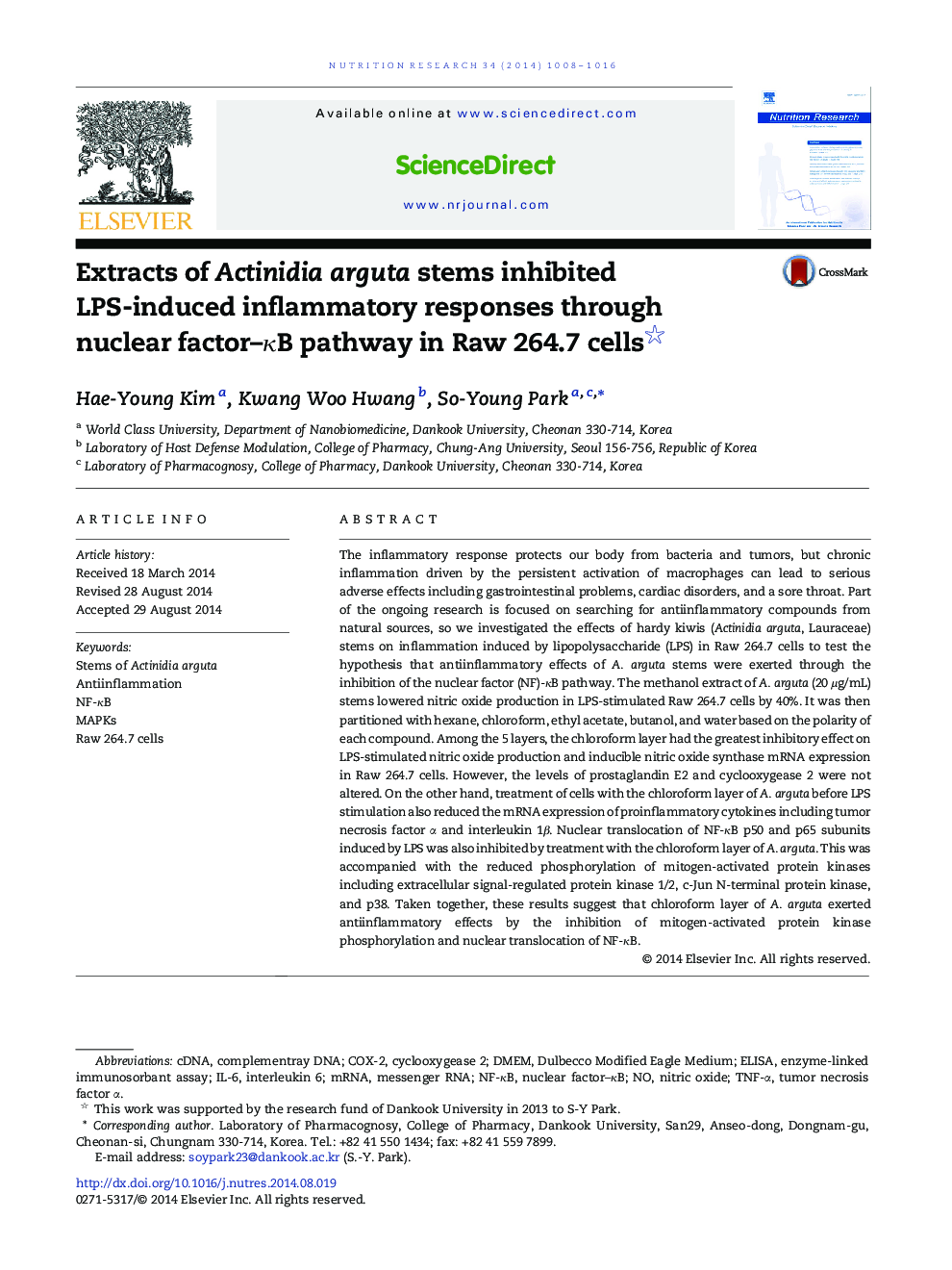| کد مقاله | کد نشریه | سال انتشار | مقاله انگلیسی | نسخه تمام متن |
|---|---|---|---|---|
| 5904596 | 1158014 | 2014 | 9 صفحه PDF | دانلود رایگان |
عنوان انگلیسی مقاله ISI
Extracts of Actinidia arguta stems inhibited LPS-induced inflammatory responses through nuclear factor-κB pathway in Raw 264.7 cells
دانلود مقاله + سفارش ترجمه
دانلود مقاله ISI انگلیسی
رایگان برای ایرانیان
کلمات کلیدی
NF-κBIL-6DMEMDulbecco Modified Eagle MediummRNACOX-2cDNA - cDNAMAPKs - MAPK هاRAW 264.7 cells - RAW 264.7 سلولmessenger RNA - RNA messengerenzyme-linked immunosorbant assay - آنزیم ایمونوسیوربنت تست شدهinterleukin 6 - اینترلوکین 6ELISA - تست الیزاtumor necrosis factor α - تومور نکروز عامل αAntiinflammation - ضد التهابTNF-α - فاکتور نکروز توموری آلفاNuclear factor–κB - فاکتور هسته ای κBNitric oxide - نیتریک اکسید
موضوعات مرتبط
علوم زیستی و بیوفناوری
بیوشیمی، ژنتیک و زیست شناسی مولکولی
علوم غدد
پیش نمایش صفحه اول مقاله

چکیده انگلیسی
The inflammatory response protects our body from bacteria and tumors, but chronic inflammation driven by the persistent activation of macrophages can lead to serious adverse effects including gastrointestinal problems, cardiac disorders, and a sore throat. Part of the ongoing research is focused on searching for antiinflammatory compounds from natural sources, so we investigated the effects of hardy kiwis (Actinidia arguta, Lauraceae) stems on inflammation induced by lipopolysaccharide (LPS) in Raw 264.7 cells to test the hypothesis that antiinflammatory effects of A. arguta stems were exerted through the inhibition of the nuclear factor (NF)-κB pathway. The methanol extract of A. arguta (20 μg/mL) stems lowered nitric oxide production in LPS-stimulated Raw 264.7 cells by 40%. It was then partitioned with hexane, chloroform, ethyl acetate, butanol, and water based on the polarity of each compound. Among the 5 layers, the chloroform layer had the greatest inhibitory effect on LPS-stimulated nitric oxide production and inducible nitric oxide synthase mRNA expression in Raw 264.7 cells. However, the levels of prostaglandin E2 and cyclooxygease 2 were not altered. On the other hand, treatment of cells with the chloroform layer of A. arguta before LPS stimulation also reduced the mRNA expression of proinflammatory cytokines including tumor necrosis factor α and interleukin 1β. Nuclear translocation of NF-κB p50 and p65 subunits induced by LPS was also inhibited by treatment with the chloroform layer of A. arguta. This was accompanied with the reduced phosphorylation of mitogen-activated protein kinases including extracellular signal-regulated protein kinase 1/2, c-Jun N-terminal protein kinase, and p38. Taken together, these results suggest that chloroform layer of A. arguta exerted antiinflammatory effects by the inhibition of mitogen-activated protein kinase phosphorylation and nuclear translocation of NF-κB.
ناشر
Database: Elsevier - ScienceDirect (ساینس دایرکت)
Journal: Nutrition Research - Volume 34, Issue 11, November 2014, Pages 1008-1016
Journal: Nutrition Research - Volume 34, Issue 11, November 2014, Pages 1008-1016
نویسندگان
Hae-Young Kim, Kwang Woo Hwang, So-Young Park,